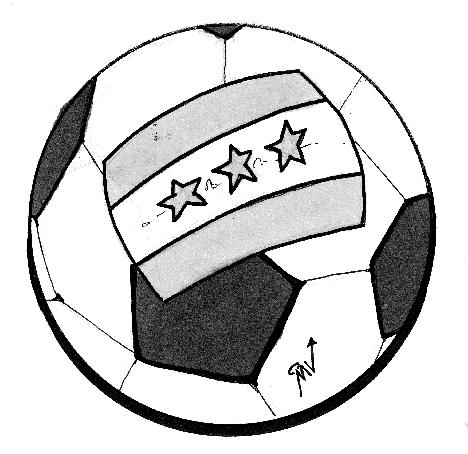Opinion cloumn: Soccer-ball diplomacy

Illustration Illustration
August 27, 2004
The Athens crowd cheered the Iraqi representatives, bearing a new flag, at the opening ceremony.
Iraq’s soccer team beat the favored Saudi Arabia to qualify for the Olympics for the first time in history. The improbable winning streak continued into the games, where they won two matches in pool play and then beat Australia to advance to the semifinals. After a loss to Portugal, they will play Italy for the bronze medal.
Their success has been one of the great storylines of this year’s games so far, so it was no surprise Bush would use it to further his campaign. In a new ad, an Iraqi flag appears onscreen as a narrator says, “At this Olympics there will be two more free nations – and two fewer terrorist regimes.”
“The image of the Iraqi soccer team playing in this Olympics, it’s fantastic, isn’t it?” President Bush said. “It wouldn’t have been free if the United States had not acted.”
The president has a point – Iraq would not be participating in the games now if the United States had never invaded. In 2003, the International Olympic Committee suspended Iraq from competition because of reports that Saddam’s son, Uday, tortured athletes he deemed underperforming. Soccer players were his favorite targets. The Olympic Commission only re-invited Iraq after the fall of Saddam and the deaths of his sons.
Get The Daily Illini in your inbox!
As a group, the soccer team is perhaps the Iraqi standard-bearer of success under new governance. They certainly believe the pre-emptive war was justified for humanitarian reasons, right?
“Iraq as a team does not want Mr. Bush to use us for the presidential campaign,” said midfielder Salih Sadir.
Coach Adnan Hamad said, “The American army has killed so many people in Iraq. What is freedom when I go to the (Iraqi) stadium and there are shootings on the road?”
“A free Iraq can be a source of hope for all the Middle East,” Bush said before the invasion. “Instead of threatening its neighbors and harboring terrorists, Iraq can be an example of progress and prosperity in a region that needs both.”
That mission has not been accomplished. It’s great that Iraq is working towards democracy, but thousands of Iraqis died in the liberation process. Shootings, car bombings, power outages and kidnappings are so commonplace now that the evening news no longer reports them. The end, so far, has not justified the means.
How has the Iraqi soccer team been able to flourish while their country has not?
First, there was a unified effort from the international community to aid Iraq in the games. The United States provided 60,000 soccer balls. Japan provided uniforms. The runners trained in Germany, the boxers trained in the United States, the weightlifters in Bulgaria and the swimmers in Canada and Kuwait. The Iraqi soccer team played all of their qualifying games safely away from home.
A similar multinational effort in nation-building would ease our military spending and lower the risk to U.S. marines. Iraqis also would be less inclined to lash out against protection by an international peacekeeping force, as opposed to occupation by perceived invaders. Foreign leaders, unfortunately, fear backlash from anti-Bush constituents if they cooperate with our president.
Iraq’s soccer team features Shiites, Kurds, Muslims, Sunni and Christians working toward a common goal. Off the soccer field, many of these diverse ethnicities have an uneasy history, including Saddam’s Sunni genocide against the Kurds in 1988. Revenge and power struggles have complicated the creation of a democracy. Rivaling ethnic groups have conflicting beliefs on issues such as the role of women in society, the balance of political power and the separation of church and state.
The effort to aid Iraqi athletes and their performance in the Olympics was so successful because the objective was singular and well-defined. Most of the credit goes to the players. The international community provided support, but we didn’t play the games for them. A similar cohesive effort is needed to secure and rebuild Iraq, but how far Iraq goes is very much in the hands of the Iraqi people. Will they learn from their soccer heroes? Let’s have faith in the Olympic spirit.
Alan Xiang is a sophomore in engineering. His column runs alternate Fridays. He can be reached at [email protected]






